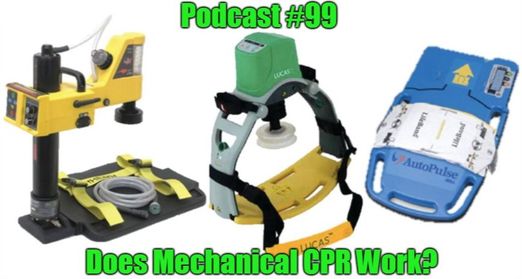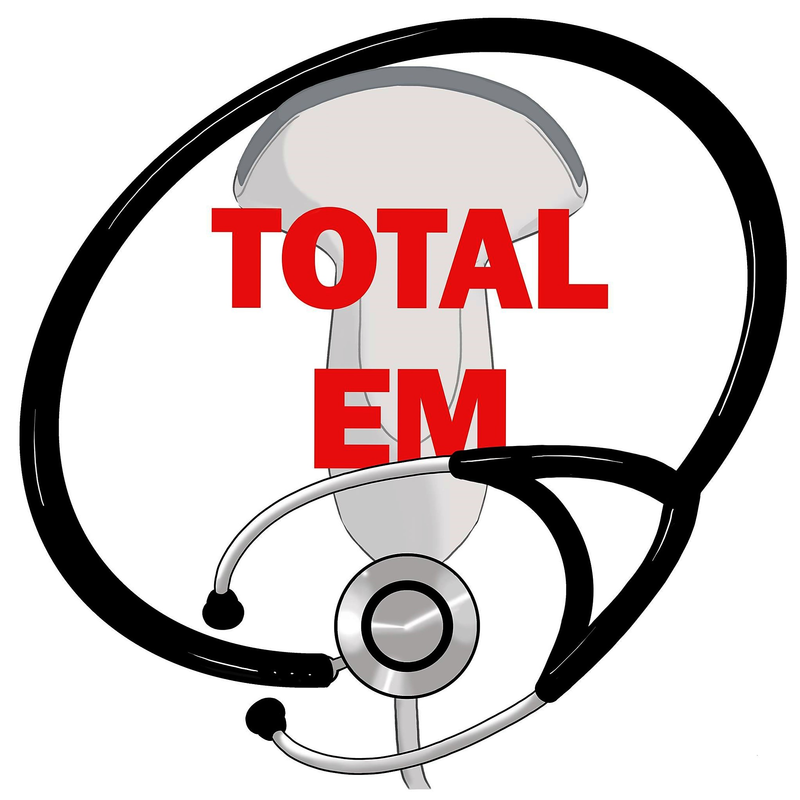|
The first time you see it, there can be any number of emotions. On some patients, it looks like their chest is being caved in by a machine. On other patients, it feels like a smooth and controlled aspect of an otherwise difficult resuscitation. There are many opinions and stories about mechanical cardiopulmonary resuscitation (mCPR), but the evidence may surprise you and lead to the question: does it work?
Mechanical CPR (mCPR) devices are automated pieces of equipment that provide chest compressions during a cardiac arrest with the idea that it allows for more consistent and higher quality compressions than can be delivered by humans. Most commonly, they are either a band (commonly the Zoll AutoPulse) or a pneumatic piston (commonly the Michigan Instruments Life Stat and the LUCAS device). There are great reviews on these devices on other #FOAMed resources such as Life in the Fastlane (LITFL).
In general, the benefits perceived with mCPR include consistent quality, fewer pauses, avoiding exhaustion in prolonged resuscitations, provide safer retrieval and transport, requires less personnel, and can potentially allow for procedures to be performed such as PCI and ECMO. However, the can be costly, require regular service and maintenance, is limited to only being appropriately for certain populations (not appropriate for children, obese, pregnant, etc), can cause iatrogenic events such as pneumothorax (where the picture above comes from), and can lose appropriate positioning over time. The biggest negative potentially are the current trials and evidence. Originally, research seemed to be favorable but over time there have been concerns with worse outcomes. In the last few years the major trials have been CIRC, LINC, and PARAMEDIC. For all three of these trials, they essentially found no statistically significant differences in outcomes. Resus.me did a great review of the LINC trial (and touching briefly on CIRC) and St. Emlyn’s discussed the PARAMEDIC trial in detail. Two more trials were added (ASPIRE from 2006 and Smekal et al in 2011) were added for a systematic review and meta-analysis in 2015 by Gates et al. This specific paper was covered very well both by REBEL EM and The SGEM. After the CARES registry came out in 2016, still more discussion was made regarding the issue. This time, it was because of the negative findings that it led to even further debate. The most significant issue with the paper though was that it was retrospective and observational in nature. However, it was well done and has been reviewed by REBEL EM and EMNerd. Experts, such as Scott Weingart, continue to advocate for its use and emphasize that it is a bridge to continue CPR with possible benefits more in the hospital versus prehospital settings. He also has a video of how to place a LUCAS device with minimal interruptions. Overall, it is good to be skeptical with mCPR. Like other controversial topics such as tPA, we may not simply have found the best population to use this device in but with more trials we can get there. With the current evidence from RCTs, it appears that mCPR most likely does not have a clinically significant benefit, but could be more beneficial as a bridge to other therapies and for use in the hospital. It also has benefits of allowing for safer transport should the EMS system where it is being applied still transports their cardiac arrest patients. Let us know what you think by giving us feedback here in the comments section or contacting us on Twitter or Facebook. Remember to look us up on Libsyn and on iTunes. If you have any questions you can also comment below, email at [email protected], or send a message from the page. We hope to talk to everyone again soon. Until then, continue to provide total care everywhere.
1 Comment
Prit Koonjul
6/17/2018 04:37:02 pm
It certainly spare an extra person for further extra task!
Reply
Leave a Reply. |
Libsyn and iTunesWe are now on Libsyn and iTunes for your listening pleasure! Archives
August 2022
Categories |
||||||


 RSS Feed
RSS Feed